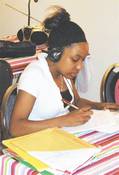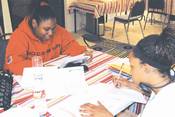Seniors
Prepare to Say Good Bye
Quantum Opportunities after school program comes to an end as Herndon High School seniors prepare for graduation.
By Brynn Grimley
February 8, 2006

Photos by Brynn Grimley/The Connection
Herndon High School senior Leigh Scott studies Thursday night at the Quantum Opportunities apartment.

Herndon High School seniors, Talesha Burke,
left, and Leigh Scott study last Thursday. Both students' grades have
significantly improved since joining the Quantum Opportunities Program.

|
|
|
At the start of high school all students work toward one common goal —
graduation. For some, the road to success is a challenging and
disappointing process, making that goal unobtainable.
For
students in the Quantum Opportunities Program, a weekly after-school
assistance program, graduation is four months away from becoming a
reality — a significant accomplishment for students who once were
academically in the lower two-thirds of their class.
"The fact that
100 percent of these kids want to go to college is huge," said Amy
McFarland, program director, Quantum Opportunities. "Two years ago that
was not the case."
The program, which started in 2000, was created
through a partnership with the Milton S. Eisenhower Foundation and
Vecinos Unidos/Neighbors United, Inc. Now called Neighbors United, the
Herndon group partnered with the foundation to help selected Herndon
High School freshmen struggling with academics.
Funded by a
four-year grant from the Eisenhower Foundation — a continuation of two
presidential commissions devoted to helping youths, minorities and
those in poverty — the program is set up to provide intervention for
selected high school students over a four-year period. It helps
students avoid negative peer pressure and offers them adult tutoring
and mentoring. Roughly 70 percent of the program's efforts are focused
on academic skills, with the remainder of the time devoted to human
development and community service, McFarland said. The hope is that
students will graduate with a better sense of themselves, the community
they live in and with a goal to pursue a secondary education.
"WHEN
I FIRST HEARD about the program I kind of thought it was a little too
good to be true," said Herndon High School senior Fabian Perez. "But
Amy [McFarland] has made that a reality. She genuinely cares, which is
something you don't find that often. I don't think I would have gotten
through high school without her."
Even with balancing a schedule of
school, work and an active social life, Perez, 18, is one of the
remaining original students selected to participate in the program.
Once
he graduates, Perez plans to attend Lincoln Tech in Maryland and then
take business classes at DeVry University. Currently working part-time
for a tire and auto center in Reston, Perez hopes to eventually own an
auto-detailing business.
"I like cars," he said, "but I don't always want to be the guy fixing them."
When
the program began it operated out of an apartment behind the
Neighborhood Resource Center and took 40 freshman who were struggling
academically. Twenty of the students were selected randomly by the
Eisenhower Foundation and placed in the after school assistance
program. The other 20 were left as the control group and not brought
into the after school program.
During its four years, the program
has competed with after school activities, jobs, boyfriends/girlfriends
and everyday stresses of high school. Due to these outside activities,
a number of the original students dropped out of the program. A number
of new students quickly filled the program, either at the suggestion of
a high school guidance counselor, or through word of mouth by fellow
students, McFarland said.
"I have seen an overall attitude change in
all of them," said McFarland, who took over after two years. "Some of
them have gone from being really negative and not wanting to do their
homework, to coming in and being happy and doing their homework without
me making them."
Factors outside of student participation, including
the support of the greater community, U.S. Rep. Frank Wolf (R-10),
Neighbors United board members, Herndon High School staff and the
students' parents, contributed to the program's success, McFarland said.
"To
me it's just been a great success," she said. "Because of this program,
10 to 17 students will now go on to be very productive young adults."
THE
PROGRAM IS set up so the students can stop into the apartment, now
located next door to Herndon's Safe Haven — also run in conjunction
with the Eisenhower Foundation — in the Parkridge Garden Apartments.
Open from 2:30 to 7 p.m., five days a week, students can come and go
from the apartment, but many choose to stay.
"I couldn't focus at
home because of the TV, the phone and all of that," said Herndon High
School senior Leigh Scott. "The best thing about this program has been
the help, because my mom wouldn't be able to sit down with me and watch
me do my homework." Currently taking trigonometry with classmate and
fellow Quantum participant Talesha Burke, both students' admit their parents would not have been able to help them understand the difficult subject.
To help, McFarland hired a math tutor through the program to work with the two students. In the two years Burke and Scott have attended the program, both have significantly improved their grades, McFarland said.
"These
kids could have gotten involved in so many other things after school,
with those being the peak hours for juvenile crime," she said. "Instead
they came here and they improved their grades."
Along with offering — for the most part — a quiet place
to study, the program also offers a safe place for the
students to hang out. Burke,
Perez and Scott each agreed that the relationships they
formed with McFarland and each other resemble that of
a family.
"It
hasn't hit me yet that I won't be seeing them every day," said
McFarland about the upcoming graduation. "It's sad, but it's also
exciting. I just want them to experience so many things right now so
when we're not here they can do it without us."
|

